To order books published by Peace Corps Writers from Amazon.com, click on the book cover, the bold book title, or the format you would like — and Peace Corps Worldwide, an Amazon Associate, will receive a small remittance that helps support our awards.
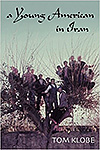 by Tom Klobe (Iran 1964–66)
by Tom Klobe (Iran 1964–66)
A Peace Corps Writers Book
$19.95 (paperback)
530 pages
December 25, 2014
IN NOVEMBER 1963, a bright Hawaiian morning is shattered by news of the assassination of the President. This marks the beginning of a journey to a remote Iranian village where a young American Peace Corps Volunteer sets out with rebellious tenacity to do what is right, unaware of America’s loss of innocence — and his own.
From a youthful determination to perpetuate Kennedy’s legacy, to coping with the reality of America’s faults and ambitions, to grappling with unfamiliar customs and languages, to discovering the friendship and love of Iranians, Tom Klobe discovers that being “Tom of Iran” is as fulfilling as being “American Tom.”
As a Peace Corps Volunteer in Iran, Tom Klobe learned the persuasive qualities of quiet leadership that enlightened his 29-year career as Director of the University of Hawaii Art Gallery. He organized and designed over 200 exhibitions, five of which received the prestigious Print Casebooks: Best in Exhibition Design award. His book Exhibitions: Concept, Planning and Design was published by the American Association of Museums Press in 2012. He has authored or edited over 35 publications.
Tales from A Muzungu
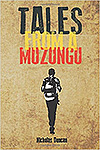 by Nicholas Duncan (Uganda 2010–12)
by Nicholas Duncan (Uganda 2010–12)
A Peace Corps Writers Book
$14.95 (paperback)
156 pages
December 21, 2014
Nicholas Duncan graduated from the University of Denver (’08) and currently lives in New York City. This is Nicholas’ first, but hopefully not last, book.
Read more about Tales from A Muzungu
Read Richard Grimsrud’s review of Tales from A muzungu
Those Were the Days — A Peace Corps Volunteer in the Philippines in the Late ’60s
 by James Beebe (Philippines 1968-73)
by James Beebe (Philippines 1968-73)
A Peace Corps Writers Book
$14.95 (paperback), $4.95 (Kindle)
162 pages
December 2014
.
THOSE WERE THE DAYS is a series of vignettes of significant, often funny, and sometimes quite serious events, from James’ Peace Corps experience in the Philippine from October 1968 to May 1973. During that time he was profoundly changed by the joy of life and economic inequality he discovered. As a Volunteer he helped introduce a new activity-based approach to science teaching, learned the truth of the children’s rhyme that “Planting Rice is No Fun,” and taught part-time at a college. For him life included buying a one-of-a-kind mosquito net, being offered a love potion, witnessing funeral processions of poor babies, celebrating holidays, and being attacked by dogs after eating dog meat.
The cloud of the Vietnam War also had a significant impact on James.
But his most life-changing event almost didn’t happen when Maria, the “matchmaker’s” intended choice for James, accused the Peace Corps of “fascism, imperialism, and neocolonialism.” His renewed efforts the following year finally resulted in a “Yes” to his proposal of a marriage to take place within weeks. James then had to secure the blessings of her grandmother, Huk Kumander Dayang-dayang. On their wedding day James and Maria had to wade through a waste-high flood, and they spent their honeymoon in a 350-year-old Catholic convent. Maria’s US naturalization and acceptance into Peace Corps as a Volunteer occurred during a 45-day trip to the US, after which they both returned as Volunteers to the Philippines.
Read more about Those Were the Days
2,000 Miles Around the Tree of Life —
A Naturalist Hikes the Appalachian Trail
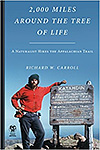 by Richard W. Carroll (Central Africa Republic 1976–82)
by Richard W. Carroll (Central Africa Republic 1976–82)
A Peace Corps Writers Book
$10.00 (paperback), $8.82 (Kindle)
126 pages
December 2014
IN 1975, WHEN NOTED CONSSERVATIONIST Dr. Richard W. Carroll made his thru-hike of the two-thousand-mile-long Appalachian Trail, he had a bachelor’s degree in biology, but his real education about nature’s splendors began long before any formal training. In Cheshire, Connecticut, his mother was known as “Lill, the Flower Lady,” the naturalist-in-residence. 2,000 Miles around the Tree of Life: A Naturalist Hikes the Appalachian Trail is dedicated to her.
Richard began his journey from Springer Mountain, Georgia, on April 14, and on September 15, he climbed Mt. Katahdin at the northern terminus of the historic trail. Along the way, he kept a journal on which his local newspaper based a series of articles. Now, he has adapted his writings and observations into this moving memoir.
Though numerous books have been written about hiking the Appalachian Trail, none have captured the exhilarating sense of awe that comes from encounters with nature in quite the same way that this lifelong naturalist has — imbuing his writing with a poetic sensibility that speaks to the heart and stirs the soul.
Since Dr. Richard W. Carroll completed his hike in 1975, many have followed his footsteps, and numerous books have been written about the trail. What this memoir brings to the genre is a passionate naturalist’s sensibilities. Like Henry David Thoreau and John Muir before him, Carroll captures the stirring sense of wonderment and awe that immersion in nature invokes. Lyrical descriptions of flora and fauna dance among insightful reflections, poems, and meditations with a simplicity and genuineness that reflect a different time. Intimate and uplifting, this journal takes you into the heart of the Eastern woodlands and inspires the same reverence for nature that has guided the author’s life as an award-winning conservationist.
Carroll went on to volunteer with the Peace Corps in the Central African Republic. He then gained a PhD in forestry from Yale University School of Forestry and Environmental Studies and launched a thirty-five-year career heading the World Wildlife Fund’s Africa and Madagascar programs.
So come along and travel deep into the heart of the ancient Appalachians, stopping to smell the flowers and ponder the majesty of the eastern woodlands as you immerse yourself in a remarkable and inspiring journey.
Ladyboy and the Volunteer
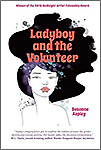 by Susanne Aspley (Thailand 1989-91 )
by Susanne Aspley (Thailand 1989-91 )
A Peace Corps Writers Book
$13.99 (paperback), $2.99 (Kindle)
288 pages
November 2014
.
IN LADYBOY AND THE VOLUNTEER Susan is a guileless young graduate out to save the world. Except, that doesn’t work out as planned. Nor can she hold her liquor, but not for lack of trying. In a land of five-foot-tall Thai men, her search for a Western man becomes almost as desperate as her longing for a cheeseburger.
Christine, the ladyboy, is a transgendered Thai prostitute who has plenty of suitors. Oblivious to her cringe-worthy curiosity about Americans, Christine shares her own world, exposing the quirks and complexities of life and love in Thailand.
Together, starting in a remote fishing village filled with both lovable and annoying characters, Susan and Christine embark on adventures that lead to loud arguments, a mysterious briefcase, alluring men and bittersweet enlightenment.
After Susanne Aspley served in the Peace Corps she later worked in Israel and England. She also served in the U.S. Army Reserve as a photojournalist in Kuwait, Bosnia, Panama and Cuba. Retired, she enjoys her kids, rescued American bulldog, elderly poodle and surly cat in Minnesota. She has never learned to eat durian.
Nigeria Revisited: My Life and Loves Abroad
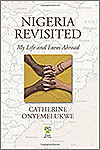 by Catherine Onyemelukwe (Nigeria 1962–64)
by Catherine Onyemelukwe (Nigeria 1962–64)
A Peace Corps Writers Book
$14.62 (paperback), $9.99 (Kindle)
299 pages
October 2014
Long Ago and Far Away
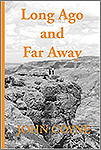 by John Coyne (Ethiopia 1962–64)
by John Coyne (Ethiopia 1962–64)
A Peace Corps Writers Book
$18.00 (paperback), $9.99 (Kindle)
342 pages
July 2014
.
Was it an accident, or murder? Four decades later, the answer still matters.
LONG AGO AND FAR AWAY, John Coyne’s 13th novel, revolves around the mysterious death of a young woman in Ethiopia in 1973. The story spans four decades and three continents, and follows the lives of four people from their early twenties to their late fifties through a series of flashbacks. Set in the diverse locations of Ethiopia, New York, Washington, Spain, and the Mid-West, Long Ago and Far Away tells of lovers driven apart by the death of their friend, and the blame they cast on each other and themselves for that tragedy. The story dramatizes the couple’s careers, marriages, families, divorces, and changes in fortune through the years with the main plot focusing on the present day, when they circle back to find each other, and set out to confront the man who knows the truth about their friend’s death.
Read more about Long Ago and Far Away
Read Kathleen Coskran’s review of Long Ago and Far Away
Dancing with Gogos: A Peace Corps Memoir
 by Gary P. Cornelius (South Africa 2012–13)
by Gary P. Cornelius (South Africa 2012–13)
A Peace Corps Writers Book
July 2014
282 pages
$13.00 (paperback)
.
DANCING WITH GOGOS IS THE STORYis the story of one man’s effort to make a difference in a collection of Zulu villages in rural South Africa, while fulfilling a life-long dream of serving in the United States Peace Corps. It’s the story of learning a new language, of immersing oneself in a different culture, of leaving a love 15,000 kilometers behind and discovering the unexpected chance to find a new one half a world away. It’s the story of South Africa’s history of apartheid and the effects of that sorry legacy on tens of millions of black Africans who to this day struggle to leave behind 500 years of oppression. Gary Cornelius and 35 other would-be Volunteers find themselves in a remote village in Mpumalanga Province as “trainees” for nine weeks of grueling learning before they can be sworn in as Volunteers in “CHOP” – Peace Corps South Africa’s Community HIV-AIDS Outreach Program – to assume front-line positions in the battle to reduce spread of the disease in a country with one of the highest rates in the world. It’s an adventure none will ever forget.
Read more about Dancing with Gogos
Read our interview with Gary Cornielius
Read Jack Alison’s review of Dancing with Gogos
Living with the Pinatubo Aetas: A Peace Corps Philippines Journal
 by Richard C. Schneider (Philippines (1969–71, 1974–77)
by Richard C. Schneider (Philippines (1969–71, 1974–77)
A Peace Corps Writers Book
$9.99 (paperback), $3.49 (Kindle)
156 pages
July 2014
.
AS A PEACE CORPS VOLUNTEER (PCV) assigned to the Philippines, Rich Schneider lived in the remote mountain village of Villar from June 1969 through June 1971, and worked with Pinatubo Aetas, an indigenous people, to increase their rice yield. The Aetas lived in permanent dwellings on a government reservation each assigned about 0.6 hectare (1.5 acres) of land suitable for planting rice. They had given up slash-and-burn agriculture, and on this land started traditional rice farming.
Rich’s assignment was to assist the Aetas increase their rice yield per hectare from 30 to 80 cavans (1 cavan = 50 kilograms) using the improved rice varieties and enhanced cultivation practices developed at the International Rice Research Institute.
Immersed in the Pinatubo Aetas’ culture for two years, Rich had expected to haul water from a spring, sleep in a Nipa hut, read by kerosene lantern, and hike long distances. He learned to eat beetle larvae, sleep under a mosquito net, stay away from insurgent activity, and to speak Tagalog. What he didn’t expect to find was a people who would share what little they had with a tall, well-intentioned Volunteer before taking care of themselves.
Living with the Pinatubo Aetas was compiled from notes, letters to his family, discussions with other PCV’s and tape recordings, and tells Rich’s story of his life during his two years in the Philippines. After reading this journal, the reader will better understand the daily life of a PCV, the customs of Filipinos, and, more specifically, the traditions of the Pinatubo Aetas.
Read more about Living with the Pinatubo Aetas
When the Whistling Stopped
 (novel)
(novel)
by David J. Mather (Chile 1968–70)
Peace Corps Writers
274 pages
June 2014
$12.95 (paperback), $6.95 (Kindle)
.
TOM YOUNG, THE CENTRAL CHARACTER in Mather’s first novel, One for the Road, continues to lament the death of his Chilean fiancé whom he met at as Peace Corps Volunteer thirty years earlier, and he decides to returns to southern Chile. There he learns that thousands of black-necked swans have disappeared from the area. It is an environmental disaster. What’s going on!
He meets a young couple, Amanda and Carlos, who suspect a new paper mill is poisoning the waters of the swans’ refuge, and they have set out to prove it. Financially strapped, the amoral mill owner can’t let them succeed in their investigation, and will do anything to stop them, including murder.
At the same time, Tom meets middle-aged Lilia, who is tortured by the memory of being raped when she was twelve years old, and he feels a stirring for her that he hasn’t felt since his fiancée’s tragic death. She too is attracted to him, and together they are soon caught up in the mill owner’s violent attempts to silence Amanda and Carlos, with disastrous results.
The tragic, surprising, and, finally, hopeful twists and turns of this fast-paced, environmental drama make it difficult to put down.
Read our interview with David Mather
Africa’s Release— The Journey Continues
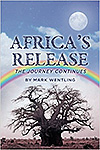 (novel)
(novel)
by Mark Wentling (PCV Honduras 1967–69, Togo 1970–73; PC Staff Togo, Gabon & Niger 1973–77)
A Peace Corps Writers Book
May 2014
232 pages
$9.76 (paperback); $4.99 (Kindle)
.
THE RESIDENTS OF GEMINI, KANSAS, had grown used to the odd man who went by the name of JB and roamed their community in a befuddled state, but when he abruptly disappeared, the townspeople found themselves facing uncomfortable questions. Perhaps JB’s elderly brother and sister, who were recluses, knew what had happened to him, but they spoke to no one, and seemed intent on taking JB’s secret, if indeed they knew his secret, to the grave with them.
Little did the townsfolk know that JB’s ramblings had all been for a purpose: to transport him back to the African village he left many years before, and he has returned to the old baobab tree that years ago had swallowed him up— an event that elevated him to the level of demigod in the eyes of the remaining African villagers.
Journey to another time and place in Mark Wentling’s magical new novel, Africa’s Release – the second in his African trilogy — as JB’s life and the dark discoveries in his ramshackle home are made public.
Read Leita Kaldi’s review of Africa’s Release
Posted in Paraguay
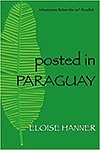 by Eloise Hanner (Afghanistan 1971-73, Paraguay 1999–2000)
by Eloise Hanner (Afghanistan 1971-73, Paraguay 1999–2000)
A Peace Corps Writers Book
$14.95 (paperback), $4.99 (Kindle)
262 pages
April 2014
.
IN THEIR LATE FORTIES, Eloise and Chuck Hanner decided they wanted to do something new and challenging for the second half of their lives. To the amazement of their friends and family, they walked away from their stock-brokerage careers and joined the Peace Corps — again. Twenty-five years before, they had gone to Afghanistan as volunteers and had loved it. They had thought it would be fun to do it again when they were older. But, Eloise and Chuck discover that it’s one thing to join the Peace Corps as carefree college graduates and quite another to go as middle-aged business professions, obligated to family and accustomed to stateside amenities. Hanner’s humorous and insightful tale will take you on a tropical journey to the middle of South America–to a small village called General Artigas, where life delivers unexpected adventures, adversities and friendships.
Read Leita Kaldi’s review of Posted in Paraguay
Read more about Posted in Paraguay
Cannons for the Cause: A Novel of the American Revolution
 by Martin R. Ganzglass (Somalia 1966–68)
by Martin R. Ganzglass (Somalia 1966–68)
A Peace Corps Writers Book
$12.99 (paperback)
338 pages
March 2014
.
CANNONS FOR THE CAUSE IS A NOVEL about the early days of the American Revolution. It is a gripping story of friendships formed, families divided, first loves, and of loyalty, courage and patriotism.
In the brutal winter of 1775–1776, sixteen-year-old Will Stoner is one of many teamsters hauling heavy cannons more than 300 miles from Ft. Ticonderoga in upstate New York to Cambridge, Massachusetts. The train of wagons and sleds struggles across the partially frozen Hudson River and through a blizzard in the steep Berkshire mountains, to bring the desperately needed artillery to General Washington, preparing to attack the British in Boston.
Cannons for the Cause places Will in the midst of actual — but little known — historical events including a race riot in Cambridge between the Marblehead Mariners, the first integrated unit of the Continental Army, and a militia of backwoods riflemen; and the stealthy night time occupation of Dorchester Heights.
With a solid sense of time and place, the tension mounts as the Continental troops on the Heights await a British assault, while the citizens of British occupied Boston continue to suffer terribly from hunger, cold, small pox, and the cruelty and greed of Loyalist militias.
Read Thomas Coyne’s review of Cannons for the Cause
The Early Years of Peace Corps in Afghanistan: A Promising Time
 by Frances Hopkins Irwin (Afghanistan 1964–67) and Will A. Irwin (Afghanistan 1966–67)
by Frances Hopkins Irwin (Afghanistan 1964–67) and Will A. Irwin (Afghanistan 1966–67)
A Peace Corps Writers Book
$17.00 (paperback); $6.00 (Kindle)
312 pages
February 2014
.
A CONVERSATION WITH THE FIRST Peace Corps/Afghanistan Director Robert L. Steiner, who brought a knowledge of Persian language and culture from growing up in Iran to setting up the program, frames the story of The Early Years of Peace Corps in Afghanistan: A Promising Time. A Foreword by former Deputy Minister of Education Saif Samady, who in an earlier role at the Ministry cooperated with Steiner on programming, notes his very special experience of working with Volunteers. Contributions from a dozen Volunteers and other staff, and records from government and personal archives expand the story. In addition, an 80-page section includes pieces written by Volunteers during this period for newsletters, and training materials that are now difficult to find.
Paradise in Front of Me: Realizing Life’s Beauty in An Unexpected Place
 by Kevin G. Finch (Honduras 2004–06)
by Kevin G. Finch (Honduras 2004–06)
A Peace Corps Writers Book
$12.95 (paperback), $4.95 (Kindle)
260 pages
January 2014